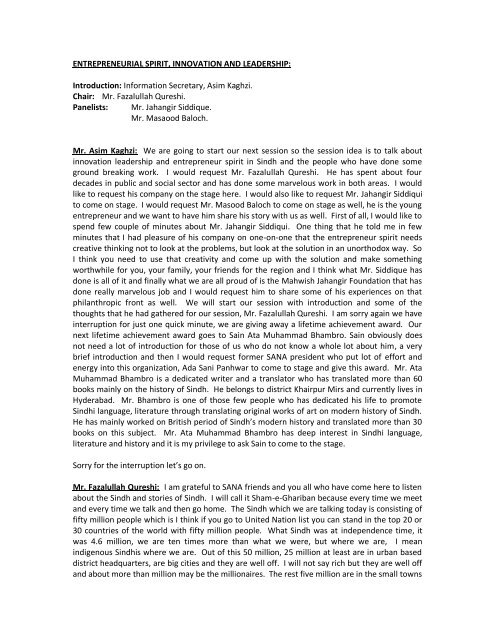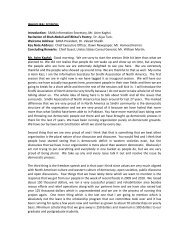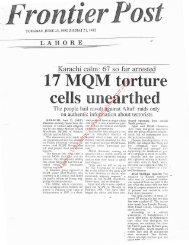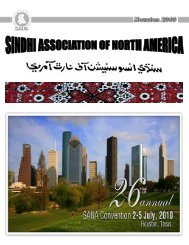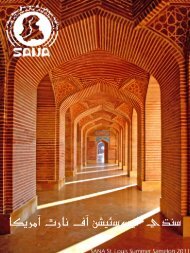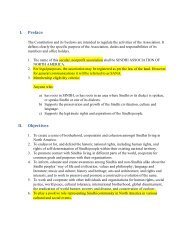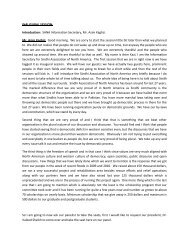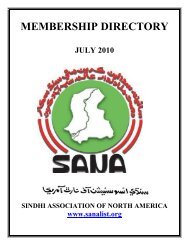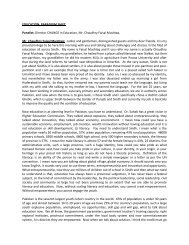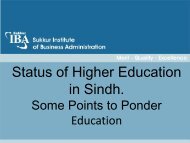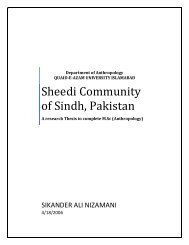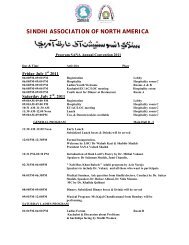Good morning - Sindhi Association of North America
Good morning - Sindhi Association of North America
Good morning - Sindhi Association of North America
Create successful ePaper yourself
Turn your PDF publications into a flip-book with our unique Google optimized e-Paper software.
ENTREPRENEURIAL SPIRIT, INNOVATION AND LEADERSHIP:<br />
Introduction: Information Secretary, Asim Kaghzi.<br />
Chair: Mr. Fazalullah Qureshi.<br />
Panelists: Mr. Jahangir Siddique.<br />
Mr. Masaood Baloch.<br />
Mr. Asim Kaghzi: We are going to start our next session so the session idea is to talk about<br />
innovation leadership and entrepreneur spirit in Sindh and the people who have done some<br />
ground breaking work. I would request Mr. Fazalullah Qureshi. He has spent about four<br />
decades in public and social sector and has done some marvelous work in both areas. I would<br />
like to request his company on the stage here. I would also like to request Mr. Jahangir Siddiqui<br />
to come on stage. I would request Mr. Masood Baloch to come on stage as well, he is the young<br />
entrepreneur and we want to have him share his story with us as well. First <strong>of</strong> all, I would like to<br />
spend few couple <strong>of</strong> minutes about Mr. Jahangir Siddiqui. One thing that he told me in few<br />
minutes that I had pleasure <strong>of</strong> his company on one-on-one that the entrepreneur spirit needs<br />
creative thinking not to look at the problems, but look at the solution in an unorthodox way. So<br />
I think you need to use that creativity and come up with the solution and make something<br />
worthwhile for you, your family, your friends for the region and I think what Mr. Siddique has<br />
done is all <strong>of</strong> it and finally what we are all proud <strong>of</strong> is the Mahwish Jahangir Foundation that has<br />
done really marvelous job and I would request him to share some <strong>of</strong> his experiences on that<br />
philanthropic front as well. We will start our session with introduction and some <strong>of</strong> the<br />
thoughts that he had gathered for our session, Mr. Fazalullah Qureshi. I am sorry again we have<br />
interruption for just one quick minute, we are giving away a lifetime achievement award. Our<br />
next lifetime achievement award goes to Sain Ata Muhammad Bhambro. Sain obviously does<br />
not need a lot <strong>of</strong> introduction for those <strong>of</strong> us who do not know a whole lot about him, a very<br />
brief introduction and then I would request former SANA president who put lot <strong>of</strong> effort and<br />
energy into this organization, Ada Sani Panhwar to come to stage and give this award. Mr. Ata<br />
Muhammad Bhambro is a dedicated writer and a translator who has translated more than 60<br />
books mainly on the history <strong>of</strong> Sindh. He belongs to district Khairpur Mirs and currently lives in<br />
Hyderabad. Mr. Bhambro is one <strong>of</strong> those few people who has dedicated his life to promote<br />
<strong>Sindhi</strong> language, literature through translating original works <strong>of</strong> art on modern history <strong>of</strong> Sindh.<br />
He has mainly worked on British period <strong>of</strong> Sindh’s modern history and translated more than 30<br />
books on this subject. Mr. Ata Muhammad Bhambro has deep interest in <strong>Sindhi</strong> language,<br />
literature and history and it is my privilege to ask Sain to come to the stage.<br />
Sorry for the interruption let’s go on.<br />
Mr. Fazalullah Qureshi: I am grateful to SANA friends and you all who have come here to listen<br />
about the Sindh and stories <strong>of</strong> Sindh. I will call it Sham-e-Ghariban because every time we meet<br />
and every time we talk and then go home. The Sindh which we are talking today is consisting <strong>of</strong><br />
fifty million people which is I think if you go to United Nation list you can stand in the top 20 or<br />
30 countries <strong>of</strong> the world with fifty million people. What Sindh was at independence time, it<br />
was 4.6 million, we are ten times more than what we were, but where we are, I mean<br />
indigenous <strong>Sindhi</strong>s where we are. Out <strong>of</strong> this 50 million, 25 million at least are in urban based<br />
district headquarters, are big cities and they are well <strong>of</strong>f. I will not say rich but they are well <strong>of</strong>f<br />
and about more than million may be the millionaires. The rest five million are in the small towns
living miserably and more miserable are the 20 million who are living in the villages, who are<br />
providing you food. Their destination not changed. They are as bad as they were.<br />
Independence or no independence does not mean for them. I used to visit upper Sindh mostly<br />
because in some NGOs, which are working upper Sindh, I used to visit the lower Sindh as well,<br />
but the conditions <strong>of</strong> people overall there, because we have recently started poverty score card<br />
system introduced by the world bank and where we are now counting the poverty where I<br />
found that almost 50% <strong>of</strong> those 20 million are around poverty line, poverty line means less than<br />
dollar a day and another 10 million are in the poverty score card which is from 1-18 that is they<br />
are below poverty line. What the government, the civil society we people here sitting here in<br />
Karachi, what we have thought about those people, what is wrong, system is wrong, politicians,<br />
civil society. I take all <strong>of</strong> those societies, the segment <strong>of</strong> the society responsible for those people<br />
because they are doing their best. Still Pakistan is the country, the backbone is agriculture and<br />
in our Sindh our backbone is agriculture. This is I think only country <strong>of</strong> the world which exports<br />
rice as well as wheat, last two years we are exporting wheat, but the people who are growing<br />
this crops what they are that we must think when we talk about the entrepreneurship, we have<br />
to talk about these people. We have to fix the responsibilities. We have to see the governance,<br />
we have to see the environment. I think Jahangir will be more talking about this subject and<br />
also I will talk more after we have heard the panelist. I am thankful to Jahangir and Masood and<br />
other friends, let them talk it and then I will try to cover it up rest, thank you very much.<br />
Mr. Jahangir Siddiqui<br />
[Urdu version]<br />
Mr. Asim Kaghzi: Thank you very much, I would request Mr. Masood to come over and share<br />
his experience. He is a young fellow, he does not have a background in computing or any <strong>of</strong> the<br />
services, but he truly has made it his business obviously and let’s hear him out.<br />
Mr. Masaood Baloch: Assalam-O-Alaikum, Thank you Dr. Valeed Sahab, thank you Ada Asim. I<br />
think we have already taken lunch so we can talk <strong>of</strong> business. I believe business opportunities<br />
are like buses because there is always an other one coming; that is why I believe and that is the<br />
reason I started business; maybe I am kidding. My brief background, introduction, I did my<br />
intermediate from Cadet College Petaro, did my MBA from Quaid-e-Azam University Islamabad,<br />
PACS and COPC certified, prestigious healthcare and call center related <strong>America</strong>n certifications.<br />
Fifteen years <strong>of</strong> experience in business process out-sourcing, did couple <strong>of</strong> jobs in private sector<br />
at senior positions the last being Vice President, AMZ Technologies then finally I decided to start<br />
my own business. Luckily, I got in touch with an <strong>America</strong>n who I partnered with to start<br />
outsourcing business in Pakistan that is how I started. Started in April 2006, hired one room<br />
apartment in Gulistan-e-Jauher, bought couple <strong>of</strong> computers and started running operations<br />
with three people without ACS in the scorching heat <strong>of</strong> May, June, July and August. I had a<br />
limited budget so did not even keep the <strong>of</strong>fice boy. The team did the cleaning and tea-stuff<br />
themselves. They did a wonderful job in satisfying the clients. We added some clients, grew<br />
and shifted to a bigger place. We kept on Alhamdulillah adding up the clients, we grew more<br />
and we shifted to Shahra-e-Faisal a business hub. Incorporated company as ACS (Arizona<br />
Computer Services Private Limited) in September 2007, became CEO and am still. Our parent<br />
company Arizona Computer Services Inc. is based out <strong>of</strong> Phoenix, AZ, established in 1970 being<br />
run by a team with 300 years <strong>of</strong> cumulative experience and being looked after by my partner<br />
Bruce Westenberg. Primarily we started as medical billing and transcription company, but now
Alhamdulillah we have the diversified portfolio with eLearning, eHealth services and solutions<br />
along with document management system, web design and development and training services.<br />
We did some project in Egypt also sponsored by government <strong>of</strong> Egypt, started participating in<br />
international exhibitions, has been a regular participant as an exhibitor in Gitex Saudi Arabia and<br />
Gitex Dubai and soon InshaAllah we will be there in CeBIT Germany and Arab Health as a regular<br />
exhibitors.<br />
Along with US, now we have a presence in Italy, Spain, Egypt and we are also trying to establish<br />
our presence in different parts <strong>of</strong> the world like Saudi Arabia, UAE, Australia and some other<br />
countries <strong>of</strong> Europe. The whole idea is to get the outsourcing business in Pakistan.<br />
Now what is outsourcing What is BPO (Business Process Outsourcing) And how it can help us,<br />
how it can help <strong>Sindhi</strong> people particularly people living in the rural areas. I would say<br />
outsourcing basically is getting the non-core business process activities <strong>of</strong> any organization done<br />
from another entity, be it an individual or an organization, it is called the outsourcing. If there is<br />
an airline, the core job would be to sell tickets to the passengers and not to develop the MIS<br />
system. Physicians sitting in <strong>America</strong>, their core job would be to examine patients not worry<br />
about as how the claims would be submitted with the insurance company and how to make the<br />
followup or to worry about their electronic medical records. Radiologist sitting in Saudi Arabia<br />
or maybe in any part <strong>of</strong> the world, their core job is to interpret the reports and not to develop<br />
any PACS system. The job <strong>of</strong> a court is to hear the cases, not to build document management<br />
system to archive their documents.<br />
Bill Gates says: “Personal computers will be window to everything that we are interested into<br />
and everything that we would need to know.” So here comes in the opportunity because with<br />
the advent <strong>of</strong> internet and information technology, the organizations are trying to get their back<br />
<strong>of</strong>fice work outsourced to the areas where it could be done at cheaper rates. It runs around 300<br />
billion dollar industry that is addressable.<br />
One in nine out <strong>of</strong> US IT jobs were to be outsourced by 2010; people estimate that by<br />
outsourcing there could be cut <strong>of</strong> cost by 40%. So that is the reason that our main focus and our<br />
future vision revolves around outsourcing. We just want to establish a sustainable outsourcing<br />
business model and expanded it into the rural part <strong>of</strong> the country at the district, subdivision and<br />
village level.<br />
We will start with one province, Sindh Province and one village. Why because you know the<br />
rural areas are going to be the attractive out-sourcing destinations. By integrating the<br />
technology and the trained source in the rural areas, we would like to capitalize on this<br />
opportunity. And there could be another important leverage out <strong>of</strong> this that is you know<br />
developing the local entrepreneurship in the rural areas, that is very important. Now how can<br />
we do that We have about close to 23 districts in Sindh and 97 subdivisions excluding the<br />
thickly populated districts, five in Karachi and one in Hyderabad, we will be left with 16-18<br />
districts and 75 subdivisions. If we establish the outsourcing units by giving the connectivity to<br />
16 districts, 75 subdivisions and 10,000 villages, we can calculate the figure. Consider that 50%<br />
<strong>of</strong> them employ 20 people each and they give salary to tune <strong>of</strong> $300 per person per month. We<br />
will have you know employment opportunity to 100,000 people and that is very good number.<br />
The employment and the outsourcing in the rural areas will have a significant impact on the
social economic dynamics because the IT sector is one <strong>of</strong> the largest employment creators in the<br />
world in the emerging economies and this also gives benefits to the downstream sectors as well.<br />
The Indians believe that there are 80-90 million people required to take care <strong>of</strong> the entire<br />
world’s back <strong>of</strong>fice operations needs. Along with this, we can bring in sustainability and<br />
economic prosperity. Sustainability will be there in the flow <strong>of</strong> the people living in the rural<br />
areas, there would be an economic prosperity as the spending would be there. They will have<br />
the money, they will spend and the economic activity will have a positive impact on the overall<br />
development <strong>of</strong> the rural areas. The IT training to the youth in the rural areas will give them<br />
exposure to the skills which are highly valued in today’s world; that is very important and then<br />
we can also have lot <strong>of</strong> money in the rural areas they will begin to thrive. They will think<br />
positively and they will be able to build careers and they will have lot <strong>of</strong> jobs. Along with this,<br />
there will be a less burden on the urban areas because if we start providing jobs to the people in<br />
the rural areas they will stay back. They will prefer to work close to their areas and then we will<br />
have lesser basic amenities problem and environmental problems and the broader impact<br />
would be to you know bridge the digital gap in the rural areas and urban areas, stem the brain<br />
drain, we will reverse the migration and there will be reduced infrastructure pressure.<br />
In the end I would say that definitely there would be challenges but we will start with one pilot<br />
project from one village may be. If proven successful, then we will identify people and train<br />
them in different verticals. The challenges and obstacles would be there definitely, but it is up<br />
to us to turn them into the opportunity and if we overcome them we will be winners. If we<br />
allow them to overcome us we will be the losers. So it is our choice and it is only our choice. It<br />
is better to be exhausted from the success then to be you know rested from the failure and I<br />
think that is my message and that is the bottom line <strong>of</strong> today’s theme which is 21 st century Sindh<br />
choice & challenges.<br />
Mr. Fazalullah Qurashi: Real problem to me was the subject today was challenges and choices<br />
and perhaps we are failed to discuss the challenges and choices how we see the Sindh future. I<br />
told you about the economic poverty, but the question is we have talked about the<br />
entrepreneur spirit innovation and leaderships but what about the environment, what is<br />
environment that we had in Sindh today. We say fact <strong>of</strong> production, land, labour,<br />
entrepreneurship. We have land but without the infrastructure. We do not have power. We<br />
have got 20-hour load-shading in rural Sindh and about 8-hour load shading in urban cities. We<br />
do not have gas, we do not have portable water. About more than three million people are with<br />
hepatitis B, HIV AIDS occurrence in Sindh is the largest and in these environment what is the<br />
state role, where is the state, what about the law and order situation. If you start business you<br />
have to give seed money, when you earn the business you have to give (bhatta) and we are<br />
talking about the environment, we are talking about the entrepreneurship. What<br />
entrepreneurship you are expecting in this environment. Again going back to the conditions, to<br />
me one <strong>of</strong> the most disturbing element is not slow economic growth in Pakistan but it is unequal<br />
distribution <strong>of</strong> benefits <strong>of</strong> whatever growth that take place yet. The Pakistan is elite capture.<br />
There are monopolies and they are protector <strong>of</strong> monopolies sitting in the assemblies. They have<br />
got their businesses and there are laws to protect them, it may be sugar mafia, it may be<br />
fertilizer whatever it may be and you get the policy decisions for your mills. You are compelling<br />
the government agencies to buy the surplus when it is cheap in the market and then you<br />
insisting on importing the things when you want, it is a cheap in the country you want to import.<br />
I have seen in the forums these types <strong>of</strong> policy making. One <strong>of</strong> the manifestation <strong>of</strong> extreme
poverty and marginalization can be witnessed in interior Sindh, rural Sindh and interior <strong>Sindhi</strong>s<br />
which have provided hospitality to all the newcomers for centuries are suffering from social<br />
marginalization by those who are warmly welcomed by us. These are the ground realities in the<br />
province <strong>of</strong> Sindh. So whosoever is there in the power have to rethink. Therefore, now we are<br />
people talking for the change and the change is eminent because you cannot keep all people all<br />
the time as your servant so who is savior in the power must create environment for the<br />
entrepreneurship otherwise everything will be lost, thank you very much.<br />
Mr. Asim Kaghzi/Dr. Valeed Shaikh: Time again for lifetime achievement awards <strong>of</strong> course if I<br />
did this convention and just gave lifetime achievement award I would still be doing it that are<br />
great great great people in this land. Our next lifetime achievement award recipient is Nur-Ul-<br />
Huda Shah and I would request my dear friend and the spirit behind this convention. So I will<br />
request Yasir to come up. Nur-Ul-Huda Shah is a gifted and famous writer and poet. She has<br />
also written number <strong>of</strong> creative plays for TV in <strong>Sindhi</strong> and English languages since last three<br />
decades. She is famous for her rebellion themes, creative diction and social courage. She was<br />
born in Hyderabad to a highly educated family <strong>of</strong> Hyderabad Sindh and got her early education<br />
from Lahore. Nur-Ul-Huda shah introduced a range <strong>of</strong> themes in her short stories and poetry<br />
with highly creative and original diction, feudal custom, obsolete cultural traditions, gender<br />
equality, freedom, emancipation <strong>of</strong> <strong>Sindhi</strong> and <strong>Sindhi</strong> women. Due to her famous play, she is<br />
equally famous in Pakistan and India. She currently resides in Karachi, Sindh. Please give a long<br />
hand. In the same theme we the members <strong>of</strong> SANA are so delighted and pleased and happy and<br />
I do not know what the words are that Sain those who have noticed Sain Ibrahim Joyo has<br />
joined us today, please give him, please stand up. I was telling this friend <strong>of</strong> mine. Does not<br />
need the introduction, I will do anyway. Mr. Mohammad Ibrahim Joyo is a legendary scholar<br />
and a dedicated teacher. He was born in a small village near Sunn District Jamshoro in 1915. He<br />
is the author <strong>of</strong> more than 30 books in pure literature, history, language, politics, philosophy and<br />
range <strong>of</strong> subjects. He is a teacher to many eminent scholars, writers and poets <strong>of</strong> Sindh like<br />
Rasool Baksh Palejo, Sheikh Ayaz, Siraj-ul-Haq Memon. He has served in many prestigious and<br />
educational literary institutions, Sindh Madarsatul Islam and <strong>Sindhi</strong> Adabi Board. He is one <strong>of</strong><br />
the greatest intellectual icons <strong>of</strong> modern Sindh who has influenced generation <strong>of</strong> <strong>Sindhi</strong> society<br />
for the last six decades. Sain Ibrahim Joyo is present Vice President <strong>of</strong> Sindh Progressive Writers<br />
<strong>Association</strong>. So anyway, I think I have done introducing Sain, thank you very much for coming<br />
Sain, thank you very much.


